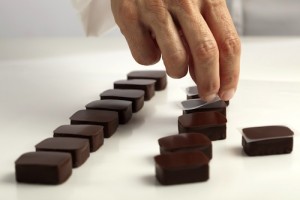 People love to debate and there is no greater source of discussion than can be found in the realm of food. As far as chocolate is concerned much of the debate centers on what country has truly ‘mastered’ the art of chocolate production. For ages there has been a debate raging: is Swiss style chocolate better than Belgian style chocolate?
People love to debate and there is no greater source of discussion than can be found in the realm of food. As far as chocolate is concerned much of the debate centers on what country has truly ‘mastered’ the art of chocolate production. For ages there has been a debate raging: is Swiss style chocolate better than Belgian style chocolate?
The truth is that we can’t know for sure. What we can know, however, is that there are major differences that make up these delectable treats. Keep reading to find out what sets Belgian and Swiss chocolate apart!
Swiss chocolate is the creamiest milk chocolate you can get.
When buying your next milk chocolate bar, you might do yourself a disservice if you choose a non-Swiss brand. The reason is simple: the Swiss invented and then summarily perfected milk chocolate! Rudolph Lindt, the founder of Lindt Chocolate, implemented the process of ‘conching’. Conching means to warm the chocolate as you grind it in between different rolling pins. The outcome is a smoother, sweeter and creamier treat. The Belgian based companies will use artificial emulsifiers when creating their chocolate to try and achieve that same result. So the outcome is very different in both flavor and texture.
Belgians invented the praline and chocolate truffle.
While we can credit the Swiss with many huge advances in the world of chocolate treats, the Belgians were ahead of the game when it came to truffles and pralines. Belgian chocolatiers have never been afraid to experiment with exotic fillings and it has brought us to where we are today with the high variety of combined treats.
Belgian chocolate will typically have a higher cocoa content.
So we’ve learned that Swiss chocolate tends to be creamier and smoother on the palette. So how does Belgian chocolate typically come off? It’s likely the next time you reach for Belgian chocolate, you”ll be grabbing something dark and bitter with a stronger bite. That’s not to say it is bad at all! Dark chocolate tastes wonderful and has a host of health benefits when consumed in moderation. Belgian chocolate providers tend to lean toward a higher cocoa content, which occurs most naturally in dark chocolate.
Swiss chocolatiers are considered masters of the profession.
Did you know that Swiss chocolate and milk chocolate are essentially interchangeable terms? Well, they are! As we referred to above, the Swiss were instrumental in developing and perfecting the smooth milk chocolate that is so popular in the world today. Because of that work, which began in the late 1800’s, the Swiss have gained a reputation for being at the forefront of chocolate development. In fact, chocolate is such a big part of their lives that studies show that the citizens of their country eat almost one entire bar of chocolate a day!
Belgians transport their chocolate in heated trunks!
Where you get your chocolate is almost as important as how your chocolate gets to you. Fortunately for dark chocolate fans around the world, Belgian chocolatiers are meticulous in their care. All Belgian chocolate is received in heated trunks. These heated containers help to seal in the flavor and smell of quality dark chocolate. So rather than letting differing temperatures alter the taste of the treat, the Belgians prefer to keep everything well protect with the finest shipment containers.
Chocolate has such a rich and lengthy history that it’s almost impossible to tell the story in one sitting. As you can see both Belgian and Swiss chocolatiers have done a fine job developing a unique treat. Visit Asher’s and order some of our own unique treats today!